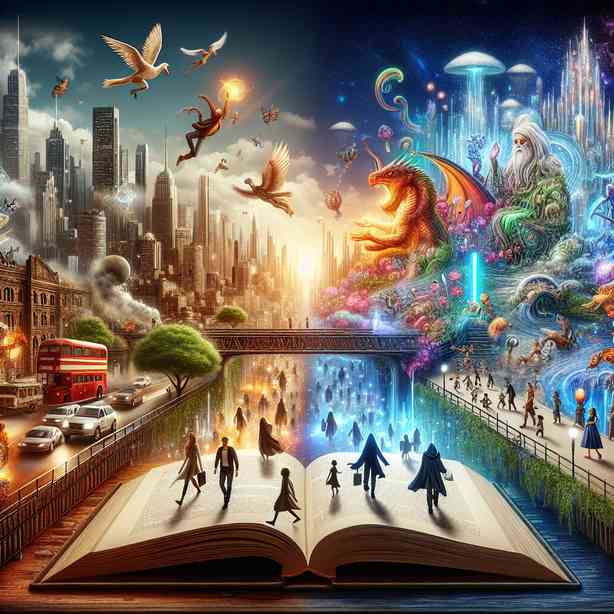
Fiction has always played a crucial role in shaping our understanding of the world around us. While many might think that fiction serves merely as an escape from reality, it often provides insights and explanations about real life that are both profound and relatable. Through stories, characters, and plots, fiction can address complex themes, emotions, and experiences in ways that resonate deeply with our own lives. This article explores how fiction can explain real-life situations more effectively than non-fiction, shedding light on various aspects of human experience.
One of the most compelling aspects of fiction is its ability to humanize abstract concepts. For instance, consider themes such as love, loss, and identity. These are fundamental aspects of the human experience that can be difficult to articulate in a straightforward manner. Fiction allows readers to connect with these themes on a personal level. For example, a novel about a character struggling with the loss of a loved one can evoke a powerful emotional response, helping readers to process their own feelings of grief and loss in a way that a clinical description of the emotional process might not achieve. By immersing ourselves in the lives of fictional characters, we can better understand our own emotions and experiences.
Moreover, fiction often explores moral and ethical dilemmas that challenge our understanding of right and wrong. Through narratives, authors can present complex situations that require characters to make difficult choices. This not only keeps readers engaged but also stimulates critical thinking about moral implications in real life. For instance, novels like “To Kill a Mockingbird” by Harper Lee or “The Handmaid’s Tale” by Margaret Atwood compel readers to confront societal issues such as racism and totalitarianism, respectively. These stories provide a lens through which we can examine our own beliefs and biases, fostering deeper discussions about justice and societal norms.
Fiction also excels at showcasing the diversity of human experience. Through various narratives, readers are exposed to different cultures, lifestyles, and perspectives that they might not encounter in their everyday lives. This representation is crucial in promoting empathy and understanding among people from different backgrounds. Books like “The Kite Runner” by Khaled Hosseini or “Americanah” by Chimamanda Ngozi Adichie illustrate the complexities of cultural identity and the immigrant experience. Through these stories, readers gain insights into the struggles and triumphs of individuals in distinct circumstances, enriching their understanding of the human condition.
In addition, fiction can serve as a mirror reflecting societal issues and challenges. Authors often write about the realities of their time, incorporating socio-political themes into their work. This can lead to greater awareness and discussion of important topics such as inequality, environmental issues, and mental health. For example, George Orwell’s “1984” is not just a dystopian tale; it provides a critical commentary on surveillance, propaganda, and authoritarianism. Such stories encourage readers to engage with the world around them, prompting reflection on current events and social issues.
Fiction’s imaginative nature also allows for exploring possibilities outside the bounds of our everyday reality. It permits readers to consider “what if” scenarios that can inspire hope, innovation, and change. For instance, science fiction often presents speculative futures that can illuminate current technology trends, ethical dilemmas, or social structures. Works by authors like Isaac Asimov and Ursula K. Le Guin challenge us to think critically about the implications of our advancements and choices. By engaging with these speculative narratives, readers can develop a vision for what the future may hold and how we might navigate it responsibly.
The interactivity between the reader and the fictional narrative further enhances understanding. Readers often bring their own experiences, emotions, and biases into their interpretation of a story, creating a unique engagement that is personal and reflective. As a result, readers can find their own meanings and lessons within the narrative, providing a tailored understanding of complex issues. This subjective interpretation strengthens the connection between fiction and real life, as individuals relate the story to their own circumstances.
Moreover, fiction can aid in the healing process for many individuals. Therapeutic storytelling, for example, encourages people to articulate their emotions through narratives, making it easier to discuss painful experiences or trauma. By seeing their feelings reflected in the experiences of fictional characters, individuals may find solace and understanding. This therapeutic aspect of fiction underscores its power to explain nuanced emotional experiences that are often difficult to express in direct terms.
The growing popularity of book clubs and literary discussions also highlights the communal nature of fiction. Sharing interpretations of a book among friends or community members can spark meaningful conversations and foster connections. Such discussions not only enhance understanding of the text but also facilitate dialogue about real-life issues it addresses. This communal exploration reveals the layered meanings of fiction, affirming that literature is a shared journey that can lead to newfound insights about ourselves and the world.
In conclusion, fiction serves as a vital tool for understanding and explaining real life in a manner that is often more profound than traditional non-fiction. By humanizing abstract concepts, exploring moral dilemmas, showcasing diversity, reflecting societal issues, and inspiring imaginative thinking, fiction offers a multifaceted perspective on the human experience. Engaging with stories allows for personal reflection, community dialogue, and even healing. In a world filled with complexity and challenges, fiction remains a powerful medium through which we can explore, understand, and ultimately navigate our realities with greater empathy and insight. It is through these narratives that we come to recognize our shared humanity, reminding us that while our experiences may differ, the emotions and struggles we face are universal.


